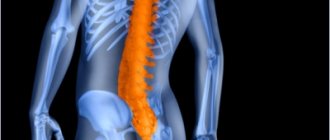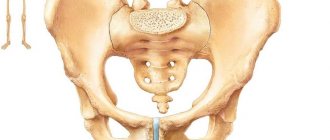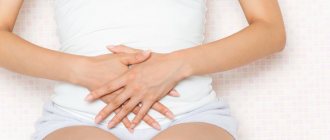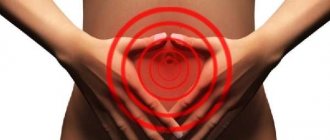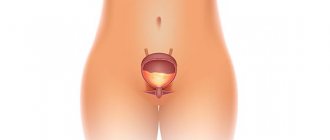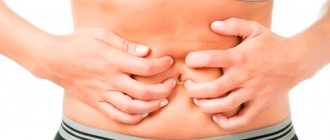Nagging pain in the lower abdomen in women, which occurs periodically or in attacks, indicates diseases of the pelvic organs or the causes are in menstrual irregularities.
Periodic attacks of pain in the lower part of the female abdomen can occur for a variety of reasons. Most likely, this is an acute or chronic, sluggish disease of the organs that are located in the pelvis, female genital organs, or pain associated with the phases of the menstrual cycle.
What might heaviness and pain in the lower abdomen indicate, what are the reasons?
A feeling of heaviness and discomfort in the lower abdomen is usually a symptom of serious diseases of the internal organs:
- Gastric dyspepsia is a disorder of the gastrointestinal tract that causes difficult digestion. This disease can occur against the background of gastric ulcers, cholecystitis, gastritis or malignant neoplasms of the digestive tract. In this case, patients have complaints of nausea, lack of appetite, a feeling of bloating and a feeling of fullness in the stomach. In this case, a gastroenterologist will help to cope with the problem.
- Biliary dyspepsia is a functional disorder of the biliary tract, most often due to stress. This condition is characterized by the following symptoms: bitterness in the mouth, nausea, migraine, pain and heaviness in the epigastrium.
- Infectious and inflammatory diseases of the reproductive organs. They arise due to the penetration of various pathogenic microorganisms into the vaginal cavity. These pathologies are accompanied by increased body temperature, copious discharge from the genitals, pain and heaviness in the lower abdomen and lower back. In addition, intestinal inflammation can also provoke painful sensations.
- Kidney diseases, which are characterized by frequent, painful urination, blood in the urine, swelling, pale skin and pain in the lumbar region. A urologist can help in this case. It is not recommended to delay contacting a doctor, since such pain is so intense that it can even lead to death.
- Inflammation of the reproductive organs as a result of hypothermia or other factors. In this case, it is recommended to consult a gynecologist as soon as possible, since the transition of inflammatory processes to a chronic form can cause reproductive dysfunction.
- Pathologies of the female genital organs, including oncological neoplasms.
- Varicose veins of the pelvis are a violation of blood flow in the genitals associated with a decrease in the elasticity of the venous wall. A sedentary lifestyle, hormonal imbalance, lack of orgasm, multiple births and genetic predisposition can lead to the development of this pathology.
Some women experience heaviness in the lower abdomen a few days before the start of menstruation, as well as in the first and last weeks of pregnancy.
Features of diagnosing the condition
If painful sensations and a feeling of fullness, distension persist for longer than 2-3 days, you should consult a gynecologist. Next, the doctor will prescribe examination by other specialists and recommend other diagnostic methods:
- vaginal and cervical smear;
- urine and blood tests;
- Ultrasound;
- laparoscopy in the absence of other examinations.
If pathologies are associated with gastrointestinal diseases, an endoscopic examination of the intestine may be required.
https://youtu.be/fDFAJ6Rmo8A
What other reasons could there be for heaviness in the lower abdomen?
A pulling sensation in the lower abdomen is a fairly common complaint among women. And if they are not associated with the imminent onset of menstruation, then most likely the reason lies in the following:
- candidiasis and other types of fungal infections, which can be caused by stressful situations, hypothermia, hormonal imbalance, diabetes, taking antibacterial drugs, etc. Clinical manifestations of these diseases include the appearance of itching and burning in the vagina, as well as copious vaginal discharge with an unpleasant odor;
- ovarian or Bartholin gland cyst. These diseases are often asymptomatic and can only be indicated by a nagging pain in the lower abdomen;
- Cervical polyps are benign neoplasms that form on the mucous membrane of the cervical canal. Characteristic signs of polyposis are pain in the lower abdomen, vaginal bleeding, pink discharge after intercourse and menstrual irregularities;
- Uterine fibroids are a benign tumor located in the muscle layer of this reproductive organ. Especially large fibroids can lead to compression of neighboring organs and disruption of their functioning;
- ectopic pregnancy - attachment of a fertilized egg outside the uterine cavity. Diagnosing this pathology is not easy, because at first it proceeds like a normal pregnancy. However, as the fetus grows, the wall of the fallopian tube stretches and ruptures, resulting in severe bleeding, accompanied by intense pain. In this case, you should immediately consult a doctor, otherwise it can be fatal;
- inflammation of the appendix, which is located in the lower intestine, can also cause a feeling of heaviness in the lower abdomen.
As you can see, a variety of, often very serious, reasons can lead to nagging pain in the abdomen. Therefore, you should not self-medicate or try to eliminate pain with medications, because this can lead to the development of dangerous complications and even death. If any discomfort occurs, it is recommended to contact a medical institution, where they will not only carry out the necessary diagnostic measures, but also prescribe a course of effective treatment.
Treatment
After the patient has been diagnosed and the exact source of the unpleasant symptom has been established, the physician can eliminate the feeling of heaviness in the lower abdomen. To quickly relieve discomfort, doctors recommend:
- do not drink too much water while eating;
- Chew or crush foods thoroughly before eating;
- do not overeat;
- choose natural and healthy products;
- engage in light physical activity;
- to walk outside;
- keep the house clean and tidy.
Further treatment is prescribed by doctors depending on the diagnosed provoking factor. If there are problems with the gastrointestinal tract, the patient is recommended to follow a gentle diet and use special medications. Drug treatment for heaviness in the lower abdomen is prescribed not only for pathology of the stomach or intestines, but also for other ailments.
Quite often, to relieve painful attacks, patients need to take antispasmodics or painkillers. To eliminate the cause of the development of the symptom, doctors prescribe medications on an individual basis, based on the characteristics of the body and the course of the disease.
Why does the lower abdomen feel heaviness?
Often, against the background of unpleasant, strange sensations in the uterine area, heaviness may appear. In fact, there can be many reasons for this phenomenon, but the most common among them are the following:
- Presence of gastrointestinal disease;
- Vascular diseases;
- Problems in the functioning of the musculoskeletal system;
- Liver diseases;
- Existing adhesions;
- Presence of uterine fibroids;
- Genital tuberculosis;
- Excessive food abuse;
- Reception of low quality products.
In most cases, this feeling of heaviness in the uterine area occurs against the background of gynecological diseases. In some cases, a woman may confuse the pain with pain from appendicitis or heaviness in the rectum. In some cases, a feeling of heaviness may occur due to the presence of varicose veins in the pelvic veins. It is women who have had multiple abortions, lifted heavy objects, or had abortions that are most susceptible to this disease.
The occurrence of painful sensations appears as a result of prolonged walking or physical activity, and can occur when lifting too heavy objects. Often this feeling is accompanied by stressful situations, in the presence of problems in the functioning of the circulatory or cardiovascular systems.
Classification and characteristics
Signs of feeling pressure in the pelvis may include:
- a feeling of pressure, heaviness, distension, fullness in the lower abdomen;
- the appearance of a feeling of pressure in the pelvis after prolonged standing, sitting, or overheating;
- pain in the lower half of the abdomen, in the lumbar region, sacrum, perineum;
- the appearance of discomfort and pain in the pelvic area after sexual intercourse;
- menstrual disorder;
- vaginal discharge;
- frequent urination or, conversely, retention;
- change in urine stream, intermittent urination;
- feeling of incomplete bowel movement after bowel movement;
- feeling of incomplete emptying of the bladder after urination;
- change in the color of urine, blood in the urine;
- upset stool, often a tendency to constipation;
- presence of hemorrhoids;
- varicose veins of the saphenous veins of the legs.
Is pregnancy possible?
Often, as a result of pregnancy, a woman may feel a feeling of discomfort in the lower abdomen.
This happens as a result of the fact that an already fertilized egg begins to attach to the walls of the uterus. At the same time, the organ itself begins to increase in size, and the pelvic bones move apart. In some cases, menstruation may not stop during the first few months of pregnancy, and almost the only symptom of pregnancy in this case may be a feeling of heaviness in the uterine area.
Painful sensations of a pulling nature often arise as a result of the fact that the female body begins its restructuring against the background of an existing pregnancy. At this time, there is a change in the previous shape of many internal organs. If we talk about the feeling of heaviness in the later stages of pregnancy, then the reason for this phenomenon may be the fact that the child gradually begins to move along the birth canal. A feeling of pressure and pain may occur because the baby begins to move, resulting in pressure on the woman’s bladder.
Any woman needs to understand that visiting a gynecologist should be regular, even if there are no outward manifestations of the disease.
Most diseases of female internal organs can occur in a latent form, so in the first stages of the disease there are no symptoms. In some cases, a woman may feel only mild discomfort, not realizing how serious and terrible the disease can be. It is for this reason that timely diagnosis of the disease and effective treatment can guarantee a quick recovery and normal well-being.
Gynecological diseases
The most common cause of discomfort in the lower abdomen is gynecological diseases. The most common pathologies in this area are non-specific inflammatory diseases.
Vaginitis is a disease accompanied by heaviness in the lower abdomen and vagina with copious vaginal discharge. Caused mainly by streptococci, staphylococci and fungi.
Endometritis is an inflammation of the mucous and muscular layers of the uterus, occurring with increased temperature, copious discharge and heaviness in the lower abdomen.
Benign neoplasms can also cause similar symptoms.
Endometriosis is a disease characterized by the growth of the endometrium outside the uterus, where it should not normally be. The manifestation of the process depends on the localization. Heaviness and pain in the affected organs on the eve of menstruation is its main symptom.
Genital cysts: ovarian and Bartholin gland cysts are mostly asymptomatic, but may be accompanied by heaviness in the lower abdomen and pain. Cervical polyp occurs with similar symptoms. Occurs mainly in the premenopausal period.
Myoma (fibromyoma) of the uterus is a benign tumor of muscle and connective tissue. Large tumors cause compression of nearby organs and cause dull pain and a feeling of heaviness, as well as disruption of the urinary system and intestines.
Also, pain may be due to abnormalities in the development and position of the reproductive organs.
Important! Early stages of malignant tumors can also produce similar symptoms.
What to do if your lower abdomen hurts and there is heaviness in it?
Rhythmic contractions of the uterus can lead to painful sensations during menstruation. Unfortunately, it will not be possible to eliminate this pathology with the help of folk recipes, but it is quite possible to reduce the intensity of painful sensations. To do this, a woman is recommended to take infusions of medicinal herbs orally a week before the start of menstruation. The best effect can be achieved by using the following fees:
- St. John's wort, calendula and chamomile. It is recommended to chop dried herbs and mix thoroughly before use. To prepare the infusion, take a tablespoon of raw material and pour a glass of boiling water. The container with the infusion should be wrapped in a warm cloth and left for 30 minutes, then strain and take half a glass orally three times a day.
- Another collection is prepared and taken in the same way - a mixture of St. John's wort flowers, valerian herb and oak bark.
It is recommended to combine the intake of herbal infusions with special exercises that can normalize a woman’s condition these days. Here are examples of such gymnastics:
- While on your knees, place your palms on the floor and smoothly rotate your pelvis, first to the left, then to the right. The optimal duration for performing this exercise is 6-7 minutes.
- Sitting on the floor, extend both legs forward and bring your heels together. Try to raise your legs above the floor as quickly as possible. Do this exercise 30 times.
Such gymnastics can activate blood flow in the pelvic organs, which will reduce pain during menstruation.
Source: womanchoise.ru
Similar articles
- Why does the uterus tingle during menstruation, reasons? If any disease occurs, the body tries to tell the person about it by any means. In most cases, people do not notice this and do not go to the doctor for examination. Women often experience unpleasant sensations...
- Causes of pulsation in the uterus during pregnancy Immediately after the good news about pregnancy, a woman strives to listen as much as possible to her sensations that arise in her body. Often, a weak pulsation occurs in the lower abdomen, which cannot be ignored. Most women with…
- Thrush in men: causes, symptoms, treatment Candidiasis, or in other words “thrush,” is caused by yeast-like fungi of the genus Candida. These microorganisms live in the microflora of the oral mucosa and on the skin. Every person constantly has the fungus in small quantities, but...
What is dysmenorrhea?
The most common cause of lower abdominal pain in women is usually dysmenorrhea. This is premenstrual syndrome, which is characterized by such symptoms as headache, unmotivated weakness and nervousness, and, accordingly, pain in the lower abdomen.
These manifestations are often present from the beginning to the end of menstruation. Often during this period the abdomen expands. With excessive production of the hormone responsible for contraction of the uterus, the organ, accordingly, contracts stronger, with greater intensity than necessary. This leads to pain in the lower abdomen.
Dysmenorrhea in young women before childbirth is called primary. In this case, the pain subsides only after childbirth. In women over 30 years of age, secondary dysmenorrhea is observed, which can be caused by disturbances in the functioning of the uterus or surgery on it, and in addition, a tumor on the female genital organs.
When should you definitely consult a doctor?
Heaviness in the lower abdomen must have a specific reason. If it is not there, then this is already a reason to visit a doctor. You need to see a specialist immediately if:
- heaviness turns into pain;
- body temperature rises;
- constipation and diarrhea alternate;
- Nausea and vomiting are bothersome;
- body weight decreases without diets and restrictions;
- weakness appears;
- the menstrual cycle is disrupted;
- cold sticky sweat appeared;
- worried about frequent urination and pain;
- there was discharge from the genital tract not associated with menstruation;
- gait is impaired;
- There was an incomprehensible weakness and decreased ability to work.
Types of pain
Pain that occurs in the lower abdomen of women is divided into several types:
- sharp, cutting;
- dull;
- cramping;
- incessant;
- pulsating.
During the initial examination, doctors focus on the location of pain and the intensity of its manifestation.
Based on the characteristics of pain and presenting symptoms, a specific disease can be diagnosed.
Table 1. Symptoms and possible diseases
| Symptoms | Most likely disease |
| Dull pain accompanied by bloody discharge unrelated to menstruation | Inflammatory process of the genitourinary system |
| Prolonged pain, intense vaginal discharge and increased body temperature | Infectious diseases of the pelvic organs |
| Constant pain due to urinary problems | Urinary tract diseases |
| Cramping pain alternating with vomiting and lack of appetite | Pathologies of the gastrointestinal tract |
| Periodically increasing pain lasting a long period of time and fever | Inflammation of the appendix |
Dysmenorrhea
Premenstrual syndrome is expressed through migraine attacks, nervousness, mood swings, weakness and pain in the lower abdomen. Manifestations of this kind both precede and accompany menstruation. These days, the stomach may increase in volume. If there is excessive production of a hormone that causes uterine contractions, the intensity of the pain increases.
Dysmenorrhea often causes heaviness in the lower abdomen
In nulliparous women, dysmenorrhea is considered primary. After the baby is born, the discomfort goes away and the cycle stabilizes. Representatives of the fair sex who have reached the age of 30 experience secondary dysmenorrhea. It is triggered by disruptions in the functioning of the uterus, operations or the formation of tumors.
Means to reduce heaviness in the lower abdomen in women
Since dysmenorrhea is a natural process occurring in the body, you can try to relieve the discomfort yourself. It is quite problematic to completely relieve the pain syndrome. It seems possible only to take measures aimed at reducing it. Folk remedies and special exercises successfully cope with this task.
A decoction of St. John's wort is an excellent remedy for heaviness and pain in the lower abdomen.
The following herbal decoctions will help cope with pain:
- Crushed leaves of St. John's wort, calendula and chamomile flowers brewed in equal parts.
- Dried dandelion roots, soaked for 20 minutes in a water bath.
- Pharmacy tincture of calendula.
- Green tea flavored with a pinch of mint and lavender.
- A collection of chamomile, mantle, rose petals, calendula and nettle.
- A mixture of oak bark and valerian.
Decoctions should be taken 3 times a day before meals. Herbs should be brewed at the rate of 20 g. for 1 glass of boiled water. Taking B vitamins, zinc, magnesium and calcium is also beneficial during this period.
In addition to traditional medicine, it is useful to do physical exercises aimed at improving the condition.
A combination of the following exercises provides significant pain relief:
- From a kneeling position, with your hands on the floor, rotate your pelvis in different directions. Recommended execution time is 5 to 7 minutes.
- Sitting on the mat, straighten your back and touch your heels. From this position, you need to try to raise your legs to your stomach about 25 times in a fast rhythm.
These simple movements help improve blood flow in the internal organs and reduce discomfort. If you have severe pain, you should visit a gynecologist.
